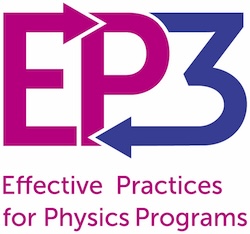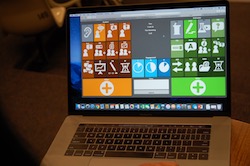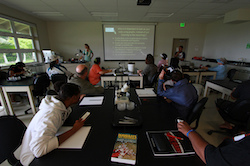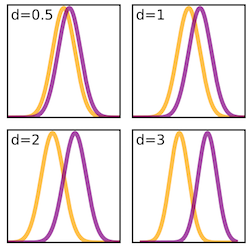assessment Recommendations
37 Recommendations are tagged with "assessment"

How to Select and Use Various Assessment Methods in Your Program
August 3, 2025 by The EP3 InititativeWe provide guidance on a variety of assessment methods and tools such as surveys, inventories, and classroom observation to measure progress and drive future action. This includes (1) general guidance on how to engage in actionable assessment and specific guidance on assessment methods for (2) departmental function and initiatives, (3) teaching effectiveness, and (4) student learning.

How can I improve assessment in my classes?
March 11, 2025 by Stephanie Chasteen, University of Colorado BoulderQuick tips from the Faculty Teaching Institute about using assessment to improve your classes.
Faculty Teaching Institute, assessment

How can I develop exams that help me fairly assess student learning?
March 11, 2025 by Stephanie Chasteen, University of Colorado BoulderThese are quick tips from the Faculty Teaching Institute for using summative assessments (primarily exams and quizzes) in ways that will assess what you value in student learning while being compassionate, clear, and fair, and facilitating student learning.
Faculty Teaching Institute, summative assessment, exams

How can I develop homework and quizzes to learn about student thinking?
March 11, 2025 by Stephanie Chasteen, University of Colorado BoulderThese are quick tips from the Faculty Teaching Institute for developing homework and quizzes to learn about student thinking. Homework and quizzes are useful tools for students to practice new concepts and skills and get feedback. In-class formative assessments (Classroom Assessment Techniques, or CATs) give on-the-spot feedback to students and teachers.
Faculty Teaching Institute, formative assessment, homework

What are formative assessment techniques?
March 11, 2025 by Stephanie Chasteen, University of Colorado BoulderFormative assessment is low-stakes, ongoing assessment to monitor students' learning and give them feedback during instruction. Classroom assessment techniques (CATs) are classroom activities to quickly gauge student understanding.
Faculty Teaching Institute, formative assessment

What are summative assessment techniques?
March 11, 2025 by Stephanie Chasteen, University of Colorado BoulderSummative assessment is assessment to evaluate student learning at the end of instruction. Summative assessment is often high-stakes.
Faculty Teaching Institute, summative assessment

How can I improve the way I grade student work?
March 11, 2025 by Stephanie Chasteen, University of Colorado BoulderThese quick tips from the Faculty Teaching Institute can be used to improve grading in your classes.
Faculty Teaching Institute, grading, assessment

How are research-based assessment instruments developed and validated?
April 10, 2021 by Adrian Madsen, Sarah B. McKagan and Eleanor C. SayreThis article discusses the process of developing and validating research-based assessment instruments in the physics and astronomy education research community.
assessment, concept inventories

Which mechanics research-based assessment should I use in my class?
April 10, 2021 by Adrian Madsen, Sarah B. McKagan, Eleanor C. SayreThis article discusses and compares 11 research-based assessments in kinematics and forces, energy, rotation and density to help instructors choose one to use in their introductory course. It also discusses one assessment for intermediate mechanics.
assessment, concept inventories, mechanics, kinematics, energy, rotation, density

Which electricity and magnetism research-based assessment should I use in my class?
April 10, 2021 by Adrian Madsen, Sarah B. McKagan, Eleanor C. SayreThis article discusses and compares 9 research-based assessments in electricity, magnetism and circuits to help instructors choose one to use in their introductory course. It also discusses 3 electricity and magnetism for upper-level courses.
assessment, concept inventories, electricity and magnetism, circuits, electrodynamics

Which quantum mechanics or modern physics research-based assessment should I use in my class?
April 10, 2021 by Adrian Madsen, Sarah B. McKagan and Eleanor C. SayreThis article discusses and compares 3 intermediate quantum mechanics research-based assessments, 5 upper-level quantum mechanics assessments and one relativity assessment to help instructors choose one to use in their course.
concept inventories, assessment, quantum mechanics, modern physics

Which thermodynamics research-based assessment should I use in my class?
April 10, 2021 by Adrian Madsen, Sarah B. McKagan and Eleanor C. SayreThis article discusses and compares 4 research-based assessments on thermodynamics help instructors choose one to use in their course.
concept inventories, assessment, thermodynamics

Which optics and waves research-based assessment should I use in my class?
April 10, 2021 by Adrian Madsen, Sarah B. McKagan and Eleanor C. SayreThis article discusses and compares 5 research-based assessments on optics and waves: 4 for introductory courses and 1 for an upper-level course.
concept inventories, assessment, optics, waves

Which astronomy research-based assessment should I use in my class?
April 10, 2021 by Adrian Madsen, Sarah B. McKagan and Eleanor C. SayreThis article discusses and compares 8 research-based assessments in astronomy to help instructors choose one to use in their introductory course.
assessment, concept inventories, astronomy

Which mathematics research-based assessment should I use in my physics class?
April 10, 2021 by Adrian Madsen, Sarah B. McKagan, Eleanor C. Sayre, and Cassandra A. PaulThis article discusses and compares 6 research-based assessments in mathematics to use in your physics class to assess students' level of math readiness for a given physics class, or to assess students' understanding of math topics that are covered in physics classes.
concept inventories, assessment, mathematics, vectors

Which beliefs and attitudes research-based assessment should I use in my class?
April 10, 2021 by Adrian Madsen, Sarah B. McKagan, Eleanor C. Sayre, and Cassandra A. PaulThis article discusses and compares 9 research-based assessments about students' beliefs and attitudes, 2 assessments about the nature of science and 3 assessments about self-efficacy in physics.
assessment, concept inventories, beliefs and attitudes, nature of science, self-efficacy

Which problem-solving research-based assessment should I use in my class?
April 10, 2021 by Adrian Madsen, Sarah B. McKagan, Eleanor C. Sayre, and Cassandra A. PaulThis article discusses and compares 3 research-based assessments on problem solving to help you choose one to use in your course.
concept inventories, assessment, problem solving

Which scientific reasoning research-based assessment should I use in my class?
April 10, 2021 by Adrian Madsen, Sarah B. McKagan, Eleanor C. Sayre, and Cassandra A. PaulThis article discusses and compares 2 research-based assessments on scientific reasoning to help you choose one to use in your course.
assessment, concept inventories, scientific reasoning

Which laboratory skills research-based assessment should I use in my class?
April 10, 2021 by Adrian Madsen, Sarah B. McKagan, Eleanor C. Sayre, and Cassandra A. PaulThis article discusses and compares 4 research-based assessments on lab skills to help you choose one to use in your course.
concept inventories, research-based assessment, labs

Best Practices for Administering Attitudes and Beliefs Surveys in Physics
June 13, 2019 by Adrian Madsen, Sam McKagan, Ellie Sayre; PhysPort director, assistant director, and research directorPhysics education researchers have created several surveys to assess one important aspect of thinking like a physicist: what students believe that learning physics is all about. In this article, we introduce attitudes and beliefs surveys and give advice on how to choose, administer, and score them in your classes.
assessment, beliefs and attitudes, best practices

Best Practices for Administering Concept Inventories
May 28, 2019 by Adrian Madsen, Sam McKagan, Ellie Sayre; PhysPort director, assistant director, and research directorThere are a plethora of concept inventories in physics available for faculty to use. These multiple-choice research-based tests about physics concepts are valuable because they allow for standardized comparisons among institutions, instructors, or over time. In order for these comparisons to be meaningful, you should use best practices for administering and interpreting the tests.
assessment, concept inventories, best practices

Which observation protocols are available online?
January 22, 2019 by Cassandra Paul and Adrian MadsenSeveral observation protocols are available on the General Observation and Reflection Platform (GORP). GORP is a secure web-based platform that allows users to customize existing observation protocols, (and create their own protocols), in order to simplify data collection and sharing.
observation protocols, online tools, assessment

How can I assess the level of student engagement in my class?
June 20, 2017 by Stephanie Chasteen, University of Colorado BoulderInstructors who are attempting active learning are often concerned that students won't like it, or will resist. It can be hard, even in the middle of a course, to gauge how well-engaged students are. This article focuses on ways to assess student engagement, both formally and informally.
assessment, active learning, productive engagement, student buy-in

Where can I find good questions to use with clickers or Peer Instruction?
September 26, 2016 by Sam McKagan, PhysPort directorMany research-based teaching methods in physics, including Peer Instruction, CAE Think-Pair-Share, Technology Enhanced Formative Assessment, and teaching with clickers, involve having your students discuss and answer multiple-choice conceptual questions. A challenge of using these methods is finding and writing good questions. This recommendation helps you find and write questions for your class.
Peer Instruction, CAE Think-Pair-Share, Technology-Enhanced Formative Assessment, clickers

Where can I find good activities for small group discussions?
September 26, 2016 by Sam McKagan, PhysPort directorNearly all research-based teaching methods in physics involve some kind of small group discussions of challenging conceptual activities. Finding good activities is an important component of making small group discussions work in your class. This recommendation includes links to collections where you can find activities to use in your class.
active learning, group work, SCALE-UP, Peer Instruction, CAE Think-Pair-Share, Technology-Enhanced Formative Assessment, clickers

Addressing common concerns about concept inventories
July 8, 2016 by Adrian Madsen, Sam McKagan and Eleanor SayreConcept inventories are useful for assessing the effectiveness of your teaching, but as you use them, concerns and questions often come up. Here we discuss some common concerns about using concept inventories and related research that addresses these concerns.
assessment, concept inventories

What are some tips for using PhET with homework?
June 28, 2016 by Stephanie ChasteenPhET simulations are free, online interactive simulations for teaching and learning science. PhET is ideal for use in homework because the simulations are designed to cue students to explore cause-and-effect relationships, even without an instructor present.
active learning, PhET Interactive Simulations, homework, assessment

Normalized gain: What is it and when and how should I use it?
March 18, 2016 by Sam McKagan, Eleanor Sayre, and Adrian MadsenIntroduction to normalized gain:
The normalized gain, introduced by Hake in 1998 "as a rough measure of the effectiveness of a course in promoting conceptual understanding," has become the standard measure for reporting scores on research-based concept inventories. Hake defined the average normalized gain as:
<g> = (<Post> - <Pre>)/(100 - <Pre>)
assessment, concept inventories, normalized gain, best practices

Effect size: What is it and when and how should I use it?
March 18, 2016 by Adrian Madsen, Eleanor Sayre, and Sam McKaganWhen making changes in the way we teach our physics classes, we often want to measure the impact of these changes on our students' learning. Often we do this by administering a research-based assessment at the beginning and end of the class and calculating the change between pre and post. There are several different measures that can be used to tell you, in one number, how to compare learning...
assessment, concept inventories, effect size, best practices

Recursos en Español / Research-based teaching resources in Spanish
March 16, 2016 by Sam McKagan, PhysPort DirectorPhysPort es un recurso de internet para apoyar a los profesores de física a utilizar estrategias de enseñanza y evaluación basadas en investigación en sus clases. El sitio es en ingles, pero muchos de los recursos a que se refiere han sido traducido a español. Esta página tiene una lista de recursos para enseñanza y evaluación…
active learning, assessment, español

Arguments for skeptical colleagues
February 12, 2016 by Sam McKagan, PhysPort DirectorDo your skeptical colleagues question you or ask you to justify your use of research-based teaching methods in physics? This recommendation provides answers to the most frequently asked questions about research-based teaching in physics from your skeptical colleagues.
-What is PER and why should I care?
-What are research-based teaching methods in physics and why should I care?
skeptical colleagues, physics education research, active learning, assessment, problem solving

Ten results of physics education research that every physics instructor should know
February 11, 2016 by Sam McKagan, PhysPort DirectorThis is a draft outline for an article describing the results of physics education research that are most important for practicing physics instructors to know and apply in their classrooms. We will be publishing the results in installments on PhysPort. The goals of this article are to explain the research behind each result in enough detail that readers can easily understand why…
physics education research, active learning, assessment, problem solving, beliefs and attitudes

Which polling method should I use for Peer Instruction?
February 10, 2016 by Sam McKagan, PhysPort DirectorSeveral research-based teaching methods, including Peer Instruction, CAE Think/Pair/Share, and Technology-Enhanced Formative Assessment, involve asking students to discuss and answer multiple-choice conceptual questions in class. There are at least three methods of collecting students’ answers to these questions: clickers, flashcards, and show of hands. Lasry…
clickers, flashcards, Peer Instruction, CAE Think-Pair-Share, Technology-Enhanced Formative Assessment, active learning

Administering research-based assessments online
February 10, 2016 by Adrian Madsen & Sam McKagan, PhysPort Assistant Director & DirectorAn overview of ways to administer research-based assessments online. Includes general guidelines and details about platforms for administering specific assessments including the FCI, FMCE, BEMA, CSEM, PCA, SOSESC-P, EMCS, CLASS, LSCI, E-CLASS, PLIC, FliP-CoIn, and MBT.
assessment, concept inventories, best practices, online tools

How can I get my students’ answers to concept inventories into electronic spreadsheets?
February 10, 2016 by Sam McKagan, PhysPort DirectorIf you are using multiple-choice concept inventories such as the FCI, BEMA, or CLASS to assess your students’ learning, the PhysPort Data Explorer can help you get instant analysis and visualization of your results. In order to use the Data Explorer, you’ll need to have your students’ responses in some kind of electronic spreadsheet, such as an Excel or .csv file.…
assessment, concept inventories

Security FAQ for the PhysPort Data Explorer
January 22, 2016 by Eleanor Sayre, Sarah McKagan, and Adrian MadsenA common question about the Data Explorer is: "This all sounds great, but can I really upload student data to your site? Is it safe and secure? Do I have to have approval?" We've compiled detailed responses to these Frequently Asked Questions and more about the Data Explorer's safety and security.

How do I get my students to take concept inventories seriously?
January 12, 2016 by Adrian Madsen, PhysPort Assistant DirectorConcept inventories are useful for assessing the effectiveness of your teaching, but only if your students take them seriously. You may be worried about how seriously your students are taking them. Here is what we know about students taking concept inventories seriously and some ideas for how you can encourage your students to do their best on these kinds of tests.
How seriously do…
assessment, concept inventories



